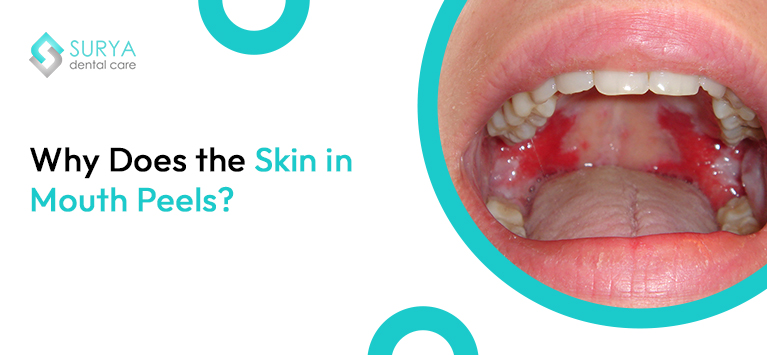Peeling of skin inside the mouth refers to the shedding skin in the mouth or scaling of skin that lines the inner of the mouth, cheeks, lips, gums, and tongue. It can manifest as white stringy skin inside mouth or even open sores. Peeling skin inside the mouth can occur due to a variety of reasons, including dehydration, dry and cold weather, certain medical conditions like oral thrush or lichen planus, and even aggressive brushing or abrasive dental care products. In this blog post, we will explore the various causes of skin peeling inside the mouth and provide some tips on how to prevent and treat this common issue.
Importance of Oral Mucosa
The inside of the mouth, cheeks, lips, gums, and tongue are lined by the skin called oral mucosa(soft tissue lining of the oral cavity), which acts as a barrier against infections and keeps food particles from penetrating the inner tissues. It also serves as an essential defensive barrier, protecting the mouth cavity from any infections. As a result, skin Peeling inside the mouth poses a significant concern as it compromises this vital protective barrier, potentially allowing infections and food particles to enter the bloodstream.
Common Causes of inside Mouth Skin Peeling
1. Irritation and Trauma
One common cause of mouth skin peeling is irritation or trauma to the oral mucosa. Excessive friction from rough brushing or the use of hard-bristled toothbrushes can lead to the Peeling of delicate mouth skin. Additionally, accidental biting of the inner cheek or lips can also result in peeling. For example, vigorous brushing with a hard-bristled toothbrush can create tiny tears in the skin lining your mouth.
2. Allergic Reactions
Allergic reactions to certain foods, medications, or oral care products can trigger peeling inside the mouth. Substances such as cinnamon-flavored candies, acidic fruits like pineapple or citrus fruits (highly acidic), and some antibiotics like penicillin are known allergens that may cause peeling in susceptible individuals. An example would be an individual experiencing skin peeling inside their mouth after consuming pineapples due to an allergic reaction.
3. Infections
Various infections may also contribute to skin peeling inside the mouth. Fungal infections such as oral thrush (caused by Candida albicans) and viral infections like herpes simplex virus (HSV) can lead to flaking and scaling within the oral cavity. These infections are commonly associated with symptoms like white patches on mucous membranes accompanied by pain or discomfort.
4. Dry Mouth Syndrome
Chronic dryness in the mouth caused by reduced saliva production is another possible cause of skin peeling inside your mouth. This may occur due to certain medications, dehydration, or certain medical conditions. Dry mouth can make the oral tissues more vulnerable to irritation and damage. A prime example would be an individual experiencing skin inside mouth peeling due to a side effect of medication resulting in reduced saliva production.
5. Nutritional Deficiencies
Inadequate intake of essential nutrients like vitamins and minerals can lead to skin peeling inside the mouth. Deficiencies in vitamins B2 (riboflavin), B3 (niacin), B6 (pyridoxine), or iron can negatively impact the health of oral tissues, resulting in peeling or cracking skin. For instance, a deficiency in vitamin B3 may cause the skin inside your mouth to peel and appear red and inflamed.
How to stop the Peeling of skin inside the mouth
1. Practice Good Oral Hygiene
Maintaining a good oral hygiene routine, including regular brushing and flossing, can help reduce the risk of irritation and peeling inside your mouth.
2. Avoid Irritants
Limit exposure to substances that may irritate the skin inside your mouth, such as tobacco smoke, spicy foods, and harsh oral care products.
3. Moisturize
Use lip balms or moisturizers specifically designed for use in the mouth to keep the skin hydrated and prevent dryness.
4. Identify Triggers
If you notice a pattern between certain foods or activities and peeling skin inside mouth, try to identify triggers and avoid them whenever possible.
When to Consult Professionals for Skin Peeling Inside Mouth
1. Persistence or Worsening Symptoms
If the skin sloughing in mouth or Peeling of skin inside mouth persists for more than two weeks despite home remedies or over-the-counter treatments, it is advisable to seek professional medical advice.
2. Painful Sores or Ulcers
If you experience painful sores, ulcers, bleeding, or difficulty eating due to peeling skin inside the mouth, consult a healthcare professional for proper evaluation and treatment.
3. Recurrent or Chronic Peeling
If you consistently experience recurring episodes of peeling skin inside the mouth, it is essential to consult a professional. They can help identify underlying causes and develop an appropriate management plan.
Treatment Options for skin Inside Mouth Peeling
When seeking professional help for peeling skin inside the mouth, a healthcare provider may conduct a thorough examination, review medical history, and recommend the following
1. Prescription Medications
Based on the underlying cause, your healthcare provider may prescribe antifungal medications for oral thrush or topical corticosteroids to reduce inflammation.
2. Allergy Testing
In cases where allergies are suspected as the cause, allergy testing might be recommended to identify specific triggers and eliminate them from your daily routine.
3. Dietary Modifications
If nutritional deficiencies are found to be contributing factors, dietary modifications or supplements may be suggested to address any nutrient gaps.
Takeaway
Peeling of skin on roof of mouth or inside mouth skin peeling both can be a discomforting experience, often accompanied by pain, sensitivity, and even bleeding. While some instances can be managed at home with over-the-counter remedies, persistent or worsening symptoms should prompt consultation with a healthcare professional. Contact our experts at Surya Dental Care, who have consulted large numbers of patients for skin peeling inside the mouth.
By seeking timely medical advice and adhering to recommended treatments, you can effectively manage this uncomfortable condition and maintain oral health.



